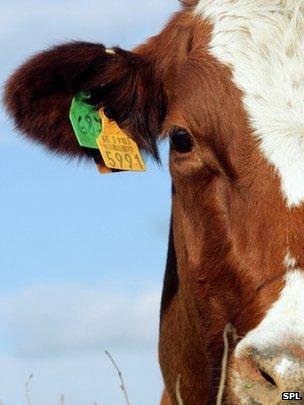Bovine TB slaughter numbers up 10%
- Published

The total number of new TB cases was 5.5% higher in 2012 than in 2011
Bovine tuberculosis (TB) led to the slaughter of more than 38,000 cows in Great Britain in 2012, a nearly 10% increase on 2011 figures.
Statistics released, external by Defra suggest that testing in Britain increased by about 6% between 2011 and 2012.
The issue of if and how to cull badgers, which spread the disease, has been fraught by disagreements on practicality and animal rights.
Defra said the disease had "potential to become a national crisis".
The total number of cattle tested for TB in Britain during 2012 was 8,018,431, up 5.7% from 2011.
The total number of new TB incidents was over 5,100 - up 5.5% on 2011 - with 3,941 in England, 1,115 in Wales and 53 in Scotland.
But together those nations saw more than 38,000 cows slaughtered (28,284 in England, 9,307 in Wales and 419 in Scotland), as animals thought to have come into contact with infected cows were also put down.
"Bovine TB continues to spread at an unacceptable rate, leading to the slaughter of thousands of cattle and ongoing misery for our dairy farmers," said Farming Minister David Heath.
"What was once confined to a small area of the South West has the potential to become a national crisis and if left unchecked could cost the taxpayer £1bn over the next 10 years.
"We cannot afford to sit back and let this happen, which is why we are doing everything we can to get on top of this dreadful disease."
The trickiest issue is how to deal with the badgers that spread the disease; many argue that a cull would be ineffective and instead suggest a programme of vaccination.
The government postponed a nationwide badger cull in a last-minute decision last autumn, but approved pilot culls in Gloucestershire and West Somerset to begin in June.
- Published1 January 2013
- Published23 October 2012
- Published27 February 2013